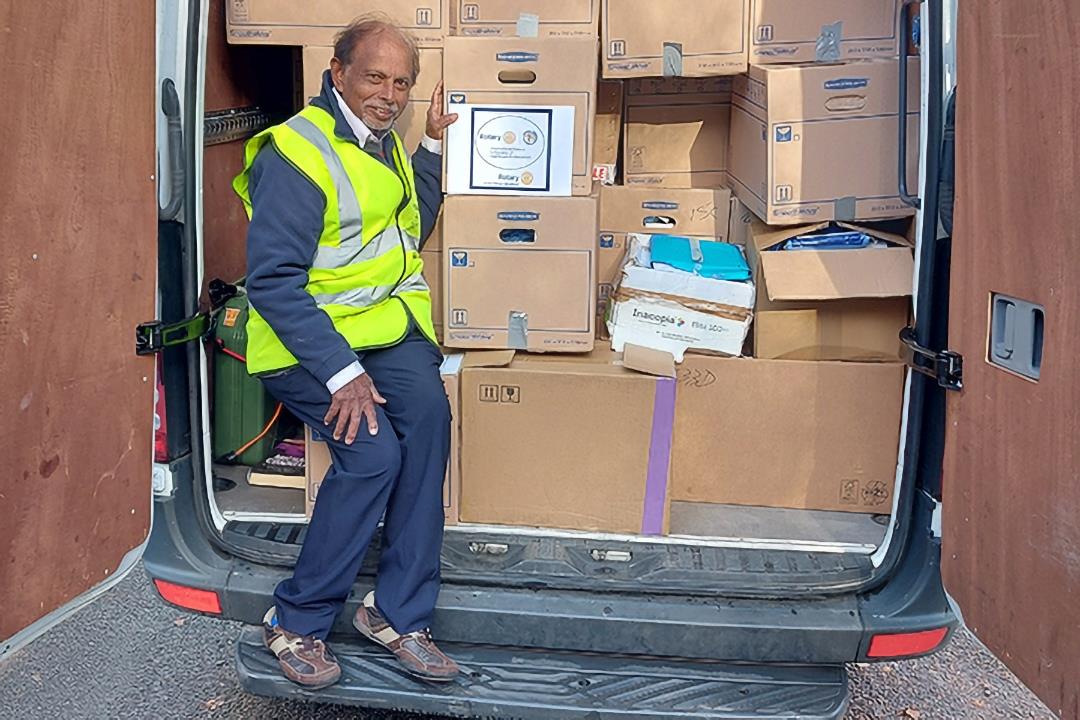
By Dr. John Philip, a member of the Rotary Club of Newbury, Berkshire, England, and Chair of the International Fellowship of Healthcare Professionals
I recently traveled 1,350 miles from my home in Newbury, South England, through France, Germany, and Poland to the Ukraine border. My role was mainly one of providing navigation for the relief supplies we were delivering. I was joined by two Scottish colleagues, each driving a van packed tight with 120 boxes of vital medical equipment.
I’d be lying if I said I didn’t have some trepidation about the journey, but it was one I felt compelled to make. I felt a deep sense of personal responsibility, both to the Rotary members who’ve generously supported the International Fellowship of Healthcare Professionals’ relief work, and to all the Ukrainians whose lives this equipment could ultimately save.
Since March 2022, Fellowship members have collaborated with colleagues in Ukraine and other countries to regularly evaluate the population’s medical needs. This helps us offer medical aid in a selective way, prioritizing needs and maximizing the impact of our aid.
Several months into the war, I became concerned about the status of maternity care in Ukraine. We heard chilling stories of women – many of whom were displaced – being forced to give birth away from hospitals, in cold conditions. They’ve given birth in basements and even in subway stations, where crowds of people are sheltering without electricity or running water. I was surprised that maternity care wasn’t on humanitarian agencies’ priority lists.
We reached out to specialists in Ukraine, and they shared data from 37 hospitals confirming that the war was having a wide-ranging detrimental effect on antenatal and maternity care. One stark figure: 2.6% of new-borns (26 births in 1,000) suffer oxygen deprivation, known as birth asphyxia, in the first few critical moments of their lives. That’s more than 10 times higher than in developed countries, where the rate is closer to 0.2%, or 2 in 1,000 births.
The first breath of a new-born infant, often with a whimpering cry, is magical. These moments are almost always ones of joy, but they can also feel very long. When the baby doesn’t spontaneously breathe, each tick of the clock raises concerns. And the consequences of disrupted breathing can be severe. Under such stress, the possibility of babies developing abnormally is increased significantly.
To combat this, the Fellowship has launched a £95,000 (approximately US$100,700) program to reduce the incidence of maternal and neonatal complications in collaboration with other charities and groups in Ukraine. That’s enough to support 30,000 pregnant women.
The key part of the program is enabling women in labor to monitor their babies’ heartbeats using handheld, battery-operated scanners. Mothers who monitor their own babies are remarkably astute when it comes to detecting potential danger signs. When intervention is required, specialists are alerted at an early stage.
These babies are the innocent victims of war, and we need to do everything possible to increase their chances of survival.
That’s not all the Fellowship has done since last March. We’ve raised £500,000 (roughly US$530,000) to supply a huge range of emergency medical aid, including 20,000 tourniquets, orthopedic equipment, and battery-powered head torches (so surgeons can continue to perform operations in the event of power outages).
I often describe what we’ve been able to achieve as “Rotary magic.” I believe we must remain hopeful, doing our best to bring hope where there is no hope and peace where there seems no chance of peace.